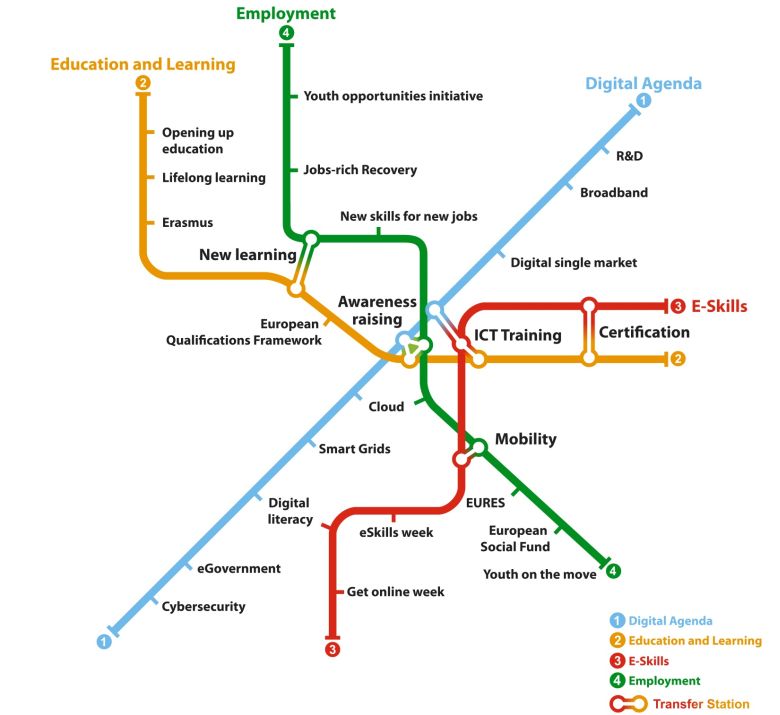
All rights reserved.
You may not copy, reproduce, republish, or otherwise use www.baltic-course.com content
in any way except for your own personal, non-commercial use.
Any other use of content requires the hyperlink to www.baltic-course.com.

Printed: 03.07.2025.
 PrintEU Digital agenda requires additional training and new skills
PrintEU Digital agenda requires additional training and new skills
The European Commission’s leading multi-stakeholder partnership, the “Grand Coalition” for Digital Jobs, aims to tackle the lack of digital skills in Europe and the thousands of unfilled ICT-related vacancies across all industry sectors. “Grand Coalition” (GC-DJ) would motivate young people to study ICT and pursue related careers.
Already in March 2013, the Commission launched the Grand Coalition for Digital Jobs: a multi-stakeholder partnership that endeavours to facilitate collaboration among business and education providers, public and private actors to take action attracting young people into ICT education, and to retrain unemployed people.
After two years in GC-DJ’s efforts, the Commission decided to facilitate the member states’ efforts in enhancing additional trainings, internships and jobs to make the Coalition sustainable. See: https://ec.europa.eu/digital-single-market/en/grand-coalition-digital-jobs
The need for digital skills
Digital technology is transforming almost every aspect of public and private life, peoples’ work and leisure. For every individual - the worker, the learner, and the citizen - the natural consequence of technological innovation is the quest for new types of skills. Yet skills development does not come about as fast as technological development; this is why most EU member states are facing a paradoxical situation: although millions of Europeans are currently without a job companies have a hard time finding skilled digital technology experts. As a result, there could be up to 825,000 unfilled vacancies for ICT (Information and Communications technology) professionals by 2020.
Moreover, there is a need for digital skills for nearly all jobs where digital technology complements existing tasks. In the near future 90% of jobs - in careers such as engineering, accountancy, nursing, medicine, art, architecture, and many more - will require some level of digital skills. At the end of the day every citizen needs to have at least basic digital skills in order to live, work, learn and participate in society.
Largest collaborative effort
Presently,
the GC-DJ is the largest collaborative effort in Europe (since 2013) aimed to
offer more ICT training co-designed with the industry sectors, job placement
programmes and education to acquire digitally aligned degrees and motivating young
people to study ICT issues.
More than 80 stakeholders, representing large and smaller companies, education providers and NGOs have made pledges, i.e. concrete commitments to act to reduce digital skills gaps. Likewise, National Coalitions for Digital Jobs aimed to facilitate high-impact actions at local level have already been launched in 13 countries (BE, BG, CY, EL, IT, LV, LT, MT, NL, PL, PT, RO, UK) and others are under formation. Furthermore, the Grand Coalition has gained large political support, including by the European Council, as well as high-level stakeholder support, such as by CEOs of global companies.
The Commission encourages all interested stakeholders to join the Grand Coalition either by making pledges for concrete short-term actions, forming or joining National or Local Coalitions for Digital Jobs, or participating in the EU events, workshops and meetings to share success lessons and best practices.
GC-DG: key priorities
A few priorities form the main work strands of the Grand Coalition for Digital Jobs. The Grand Coalition for Digital Jobs builds on concrete actions aimed at local impact, from training in ICT to certification and raising awareness.
The GC-DJ will deliver concrete actions, which can be implemented in the short-term and have high local impact. It builds on on-going programmes and best practices that could be scaled-up.
The following are some of the priorities of the actions:
· Training and matching for digital jobs – to offer training packages co-designed with the ICT industry so that the skills people get are the skills business needs;
· Certification - to improve recognition of qualifications across countries by stimulating take-up of the European e-Competence Framework;
· Innovative learning and teaching – to offer more aligned degrees and curricula at vocational and university level education so that students get the skills for success;
· Mobility – to help those with the right skills get to the place where they are needed, to avoid shortages and surpluses in different geographical areas
· Awareness raising – to attract young people to ICT, which offers rewarding and enjoyable careers to both women and men;
· Coding - to raise awareness on the importance of coding skills (European Coding Initiative)
See Table below:

The Grand Coalition helps to accelerate and intensify efforts initiated by European policies, such as the Europe 2020 strategy, the e-Skills Strategy, the Employment Package, the Opening up Education Initiative, the Rethinking Education Strategy, the Youth Opportunities Initiative, and the EU Skills Panorama.
It also aims to stimulate digital entrepreneurship by liaising with Startup Europe, a single platform for tools and programmes supporting people wanting to set up and grow web start-ups in Europe. See:
https://ec.europa.eu/digital-single-market/en/key-priorities-grand-coalition;
Funding
The Grand Coalition does not have a specific budget line to support its activities, but there are several funding sources at European and national level to support projects boosting digital skills. A number of funding instruments are available to stakeholders as well as non-financial support can be obtained.
= European Structural and Investment Funds
This possibility was highlighted at the European Council in October 2013, which stated that "part of the European Structural and Investment Funds (2014-2020) should be used for ICT education". The following funds could be considered:
· The European Social Fund is one of the EU’s Structural Funds, and the main tool for creating more and better jobs in Europe. More than €80 billion is earmarked for human capital investment in Member States between 2014 and 2020. Organisations interested in ESF funding for a project should contact the ESF Managing Authority in their country or region. Check the ESF local contact points.
· The Youth Employment Initiative aims to support young people not in employment, education or training (NEETs) aged below 25, residing in regions experiencing youth unemployment rates above 25 % in 2012. Between 2014 and 2020, € 3.2 billion will come from targeted investment from the European Social Fund.
· The European Regional Development Fund aims to strengthen economic and social cohesion in the European Union by correcting imbalances between its regions. You can apply for regional funding to the authority managing the relevant regional programme. That body will evaluate your project and decide whether to grant funding.
See more at: Find your managing authority and other types of funds
Education & training: Erasmus+
The Erasmus+ programme aims to boost skills and employability, as well as modernise Education, Training and Youth work. €14.7 billion is dedicated for Erasmus+ programme 2014-2020. Erasmus+ will support transnational partnerships among Education, Training and Youth institutions and organisations in order to tackle the skills gaps. Organisations interested in Erasmus+ funding can contact the National agencies for Erasmus.
= Employment and Social Innovation (EaSI)
The
Employment and Social Innovation (EaSI) programme is a
financing instrument at EU level to promote a high level of quality and
sustainable employment, guaranteeing adequate and decent social protection,
combating social exclusion and poverty and improving working conditions. The
total budget for the EaSI programme 2014-2020 is €919.47 million.
Since January 2014, the EaSI supports three following program areas:
· the modernisation of employment and social policies with the PROGRESS axis (61% of the total budget); to apply for funding, eligible organisations must respond to a call for tender or/and to a call for proposals.
· job mobility with the EURES axis (18% of the total budget); to apply for funding, eligible organisations must respond to a call for tender or/and to a call for proposals.
· access to micro-finance and social entrepreneurship with the Microfinance and Social Entrepreneurship axis (21% of the total budget).
= Job mobility scheme: Your first EURES Job
Your First EURES Job is a job mobility scheme to help young Europeans find a job, traineeship or apprenticeship in other EU countries. The scheme is part of the Youth on the Move package and the Youth Opportunities Initiative. It could be incorporated into national Youth Guarantee schemes that include cooperation with other EU countries. The 2015 target for Your first EURES job is to help some 5 000 people find jobs in EU countries other than their own. The initiative involves only a limited number of employment services.
= E-skills for jobs: communication and awareness-raising campaign
The European Commission published in 2014 a call for tenders, which aimed at selecting a service provider for the organisation of a new major communication and awareness-raising campaign in Europe on 'E-skills for jobs'.
The duration of the campaign is two years (2015–2016) with a budget of € 2 million.
= Support for the Grand Coalition
Several projects are in place to support the Grand Coalition, in particular:
· The Secretariat of the Grand Coalition for Digital Jobs was created in 2014, with a budget of €1 million from the Competitiveness and Innovation programme over 2 years.
· The e-Skills Communication and Awareness Raising Campaign 2014 is a major cross sector, multi-stakeholder campaign of the European Commission, which aims to raise awareness of the need for citizens to improve their command of information and communication technology (ICT) skills for work.
= eSkills for Jobs 2014 is coordinated on behalf of the European Commission by DIGITAL EUROPE and European Schoolnet.
See more at: https://ec.europa.eu/digital-single-market/en/potential-funding.